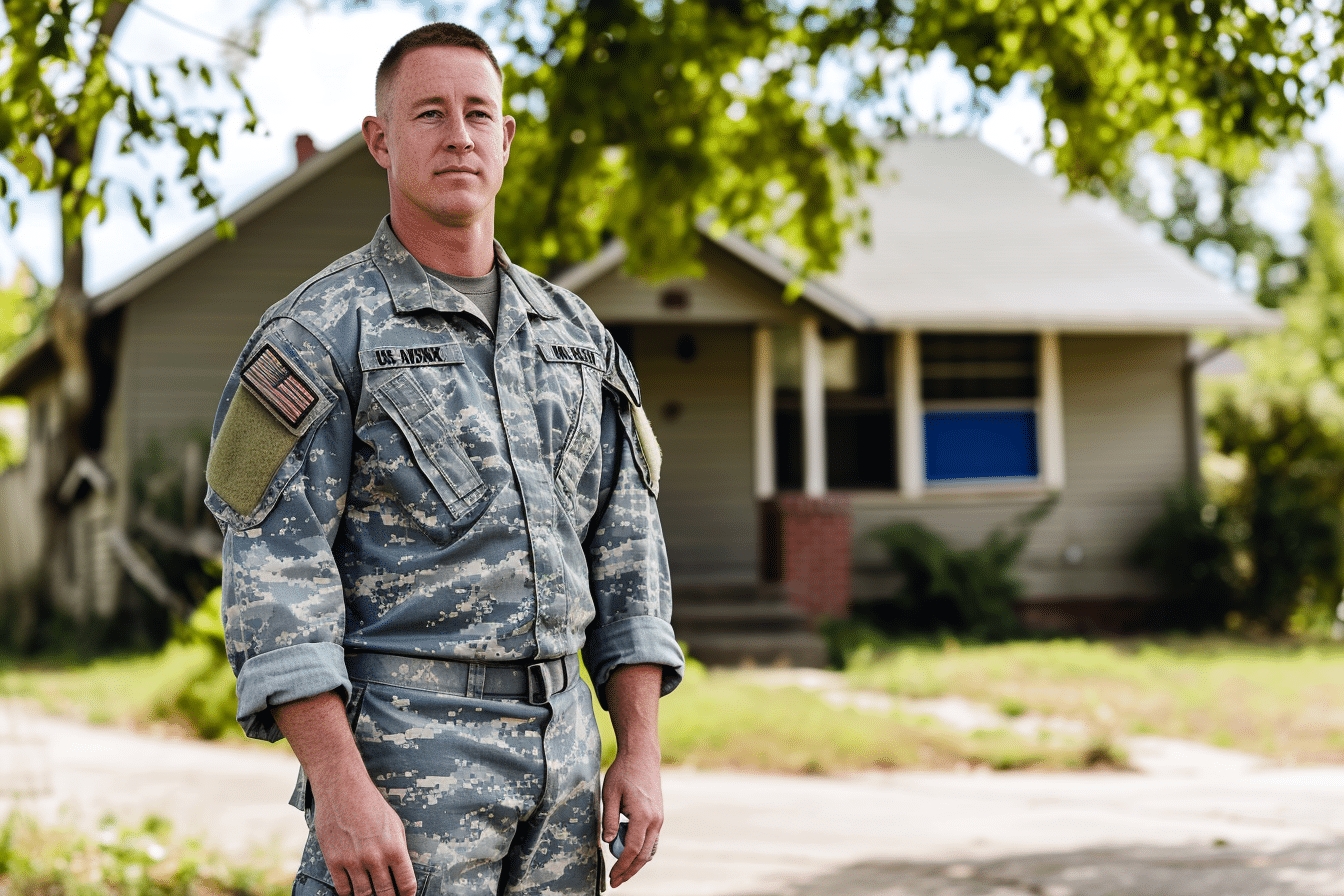
VA Loans Uncovered: The Quick Guide to Homeownership
VA loans are a unique and valuable financial resource available to veterans and service members. This type of mortgage, which is backed by the U.S. Department of Veterans Affairs, offers favorable terms that make purchasing a home more accessible for those who have served our country. In addition to offering competitive interest rates, the VA home loan program also allows for lower down payments and fewer restrictions than traditional mortgages.
However, gaining a clear understanding of VA loans is essential for potential borrowers. This includes knowing the eligibility requirements, application process, and various benefits and limitations associated with this type of mortgage. Additionally, it’s important for borrowers to be aware of the property types that qualify for VA loans and the refinancing options available under the program.
Key Takeaways from VA Loans
- VA loans provide unique benefits for veterans and service members, including lower down payments and competitive interest rates.
- Potential borrowers need to understand eligibility requirements, application processes, and property types that qualify for VA loans.
- The VA home loan program also offers refinancing options and additional resources, accessible through the VA website.
Understanding VA Loans
Eligibility Requirements
VA loans are designed for active-duty military members, veterans, and eligible surviving spouses. To be eligible, you must meet certain service requirements, such as serving on active duty for a specific period during wartime or peacetime, or as a member of the National Guard or Reserves. If you served during the Gulf War, Vietnam War, Korean War, World War II, or other conflicts, eligibility criteria may vary. Should you be interested, a Guide to VA Loans: How They Work, Who Qualifies provides helpful information.
Certificate of Eligibility (COE)
Before applying for a VA-backed loan, you need to obtain a Certificate of Eligibility (COE). This document proves you meet the service requirements for a VA home loan. You can apply for a COE online, by mail, or through your lender. Remember, an honorable discharge is essential for veterans to qualify for a VA loan.
Types of VA Loans
There are various types of VA loans, and each serves a different purpose:
- Purchase Loans: These loans help eligible borrowers purchase a primary residence without requiring a down payment or private mortgage insurance.
- Interest Rate Reduction Refinance Loan (IRRRL): Also known as the VA Streamline Refinance, this loan helps current VA loan borrowers lower their interest rate or switch from an adjustable-rate to a fixed-rate mortgage.
- Cash-Out Refinance Loan: This loan allows you to refinance a non-VA loan into a VA-backed loan while also taking cash out of your home’s equity.
Keep in mind that, regardless of the type, VA loans typically offer better interest rates than conventional mortgages.
Applying for a VA Loan
Credit and Finances
When applying for a VA loan, it’s essential to have a good credit score and stable income. Lenders, such as private banks, credit unions, and mortgage companies, will review the applicant’s credit history and finances to determine their eligibility. This helps assess the potential risks associated with lending to the borrower. VA loans offer some flexibility in terms of credit scores, but a solid financial foundation is still important.
To increase the chances of approval, it’s recommended to review credit reports and ensure the information is accurate and up to date. By maintaining healthy credit, the process of obtaining a VA loan can be smoother.
Choosing a Lender
Not all lenders offer VA loans, so it’s essential to find one that does. The process begins with researching and comparing various lenders, such as private banks, credit unions, or mortgage companies that specialize in these loans. Moreover, each lender may have their requirements and terms, so it’s crucial to understand these before proceeding with the application.
One of the best ways to find a reputable lender that offers VA loans is to visit the Consumer Financial Protection Bureau’s page on the topic. From there, borrowers can compare multiple lenders’ rates, fees, and loan terms to find the best option.
The Loan Application Process
Once a suitable lender has been chosen, the next step is to begin the application process. This typically involves gathering required documents, such as:
- Proof of military service
- Employment and income information
- Bank and investment statements
- Details of any outstanding debts
With all the necessary documentation in hand, applicants can proceed with the VA loan application. The lender will then review the credit, income, and sales price to determine the loan amount. Once approved, the VA loan can be used for various purposes, such as buying a new home, refinancing an existing mortgage, or making home improvements.
In summary, applying for a VA loan involves selecting the right lender, maintaining good credit and finances, and submitting a complete application. By following these steps, eligible borrowers can reap the benefits of this valuable home loan program.
VA Loan Benefits and Limitations

No Down Payment and Funding Fee
One of the major benefits of VA Loans is that they require no down payment for eligible veterans and service members. This advantage helps reduce the upfront costs associated with buying a home. Additionally, there is a VA funding fee, which can be financed into the loan amount or paid in cash. This fee helps support the VA loan program. For more information about eligibility for VA loans, you can review their benefits at the VA Loans website.
Loan Limits and Rates
In terms of loan limits, VA loans do have a conforming loan limit. However, these limits often change and depend on the county in which the property is located. It is essential to stay updated on these limits to avoid potential issues down the line.
When it comes to interest rates, VA loans typically have lower interest rates than conventional mortgages. Lower interest rates can save borrowers money over the life of the loan. However, it’s crucial to understand that interest rates can also depend on individual credit scores, market conditions, and lenders.
Closing Costs and PMI
Another significant advantage of VA loans is the limitation on closing costs. VA loans typically have lower closing costs than conventional loans, and the seller can pay a portion of these costs. This helps reduce the financial burden on borrowers during the home-buying process.
Finally, one of the most beneficial aspects of VA loans is the absence of private mortgage insurance (PMI). Conventional loans often require PMI when borrowers put down less than 20% of the home’s purchase price. The lack of PMI can save VA loan borrowers thousands of dollars over the life of their mortgage.
Ultimately, VA loans offer numerous benefits that can make the home buying process more accessible and affordable for eligible borrowers. It’s essential to stay updated on the VA loan benefits and limitations to ensure a successful home-buying experience.
Property Types and VA Loans

Qualifying Properties
VA loans are designed to help veterans, active-duty military personnel, and their families buy, build, or improve a home. The list of eligible properties varies, but some common ones include:
- Single-family homes: Traditional detached houses are the most common type of property considered for VA loans. These homes usually include a yard and a separate garage.
- Condominiums: Condo units are eligible if the entire condominium project is VA-approved. To find out if a specific condo is on the list, use the VA’s condo search tool.
- Manufactured homes: Buying a manufactured home and a lot are both possible options with a VA loan. However, some conditions must be met, including permanent foundations and compliance with local building codes.
- Energy-efficient homes: VA loans can help borrowers purchase homes or make improvements that increase energy efficiency. Examples include installing solar panels or enhancing insulation.
Restrictions and Considerations
While VA loans provide various options, there are some restrictions and factors to keep in mind:
- Non-residential use: VA loans are specifically for primary residences, meaning investment properties or vacation homes are not eligible.
- Mixed-use properties: It is essential to ensure that any potential property meets zoning and building codes. VA loans may cover properties designated as mixed-use (residential and commercial) as long as the non-residential portion does not exceed 25% of the property’s total area.
- Construction loans: VA loans can be used to build a new home, but the process can be more complex than simply buying an existing one. Borrowers need to work with a VA-approved builder, and the construction must be completed within a specific timeframe.
- Remaining entitlement: Borrowers who have previously used VA loans should be aware that their remaining entitlement could impact their eligibility or loan amount for a new VA loan.
In conclusion, VA loans cover a broad range of property types, from single-family homes to energy-efficient houses. However, it is crucial for borrowers to be mindful of restrictions and considerations when choosing the best property for their needs.
Refinancing with a VA Loan

Refinancing a mortgage can be a smart financial move for homeowners, especially with a VA-backed purchase loan. Let’s quickly go over two popular refinancing options available for veterans and active-duty military personnel: Interest Rate Reduction Refinance Loan (IRRRL) and Cash-Out Refinancing.
IRRRL Loan Refinancing
The Interest Rate Reduction Refinance Loan (IRRRL), also known as a “VA Streamline Refinance,” enables borrowers to lower their interest rate with minimal paperwork and hassle. Here’s what you need to know about IRRRL:
- Must have an existing VA-backed mortgage
- No appraisal or credit underwriting required
- May include closing costs in the new loan
- Lower interest rate or switch from an adjustable-rate to a fixed-rate mortgage
To make the most of an IRRRL, the new loan should have a lower interest rate than the previous loan, which can ultimately save money and possibly reduce the loan term.
Cash-Out Refinancing Options
Cash-Out Refinancing gives homeowners access to their home’s equity for various needs. With this type of VA refinancing, you can:
- Pay off debt: Consolidate high-interest debts into one lower-interest loan.
- Home improvements: Fund renovations or repairs to increase the value of your home.
- Emergency expenses: Address unexpected financial needs (e.g., medical bills).
Keep in mind, though, that using cash-out refinancing depends on the current market and the homeowner’s financial situation. Also, be prepared to go through a credit underwriting process similar to the original mortgage loan.
In conclusion, refinancing with a VA loan can be beneficial in terms of interest rate reduction and cashing out on home equity. Always remember to evaluate your situation thoroughly and consult a professional before deciding on the best course of action.
Additional VA Loan Considerations

VA Loan Usage
VA loans are versatile and can be used for various purposes. Some common uses include:
- Purchasing a home: This is the most common use of VA loans. Veterans can use their entitlement to finance the purchase of a primary residence.
- Refinancing: Veterans can also refinance their current mortgages using VA loans, often receiving competitive interest rates compared to Fannie Mae or other loan programs.
- Home improvements: VA loans can be used to make energy-efficient and accessibility improvements to the borrower’s home.
It’s important to remember that dishonorably discharged veterans, certain members of the standby, selected, or ready reserve, and those on the retired list are not eligible for VA loans.
VA Loan and Other Benefits
Veterans can combine their VA loans with other benefits available to them. For example, public health service officers, cadets of the National Oceanic & Atmospheric Administration, merchant seamen, and U.S. citizens working for certain international organizations may also be eligible for VA-backed loans.
Surviving spouses of veterans who died in service or as a result of a service-connected disability can also benefit from VA loans. These individuals should complete VA Form 26-1880 to confirm their home loan eligibility.
The Future of VA Loans
As the needs of veterans and the financing landscape evolve, VA loan programs may also adapt to better serve those who have served in the military. Future VA loan initiatives could include:
- Expanding eligibility: New categories of eligible borrowers, such as those in the Public Health Service or other federal agencies, may be added.
- Streamlining the application process: Efforts to simplify the VA loan application and approval process could help veterans access their benefits more quickly and easily.
- Implementing new loan products: VA loans could offer new types of financing tools, such as adjustable-rate mortgages or supplemental loans for home renovations, to better meet veterans’ needs.
By staying informed about changes to VA loan benefits and eligibility, veterans and their families can continue to make the most of these valuable financing options.
Need Help With a VA Loan?
If you’re seeking help, feel free to consult our recommended mortgage professionals: Central Bank, Brooke Gagliardi, and AMC Mortgage, Gordon Chandler. These two are always prepared to provide expert guidance on navigating the mortgage landscape. As always, OKCHomeSellers at McGraw Realtors stands ready to help. Just contact us!
Luxury Specialist at McGraw Realtors
With a diverse background, including a career as an Air Force fighter pilot and entrepreneurship, Bill transitioned to real estate in 1995. Co-founding Paradigm Realty with his wife, Charlene, he quickly rose to prominence in Oklahoma City’s luxury real estate scene. Now, as one of the top agents with annual sales surpassing $20 million, Bill’s dedication to exceptional service remains unparalleled. With a legacy spanning over two decades in the industry, Bill’s expertise and commitment make him a trusted name in luxury real estate.